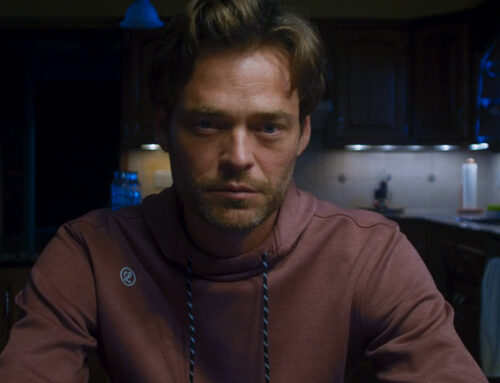Sundance 2022 Film Festival Premiere – After Yang is a quiet sci-fi melodrama written and directed by Kogonada. In his sophomore feature film debut, Kogonada displays a natural talent for storytelling through purposeful and symbolic visuals and subtle world-building. What’s more, peeks at his humor in the film’s spattering of bittersweet moments made this melodrama about both connection and disconnection in the aftermath of death feel lighter, and in the end, hopeful.
After Jake (Colin Farrell) and his wife Kyra (Jodie Turner-Smith) adopt a Chinese baby named Mika, the couple decides to purchase a refurbished android named Yang to care for her and teach her to connect with her Chinese heritage. Years later, Yang malfunctions during the family workout and goes into an off-setting, sending Jake on a mission in search of someone to fix the android they have come to think of like a son. His search uncovers the hidden history of Yang’s life before his current family as well as a mystery that suggests intentional peculiarities in Yang’s build, compelling him to understand the inner-most workings of Yang.
Starring long-time film crush Colin Farrell and one of my new favorite actresses after her stunning performance in my favorite 2019 film Queen & Slim, Jodie Turner-Smith, After Yang was one of my most anticipated films to watch at the 2022 Sundance Film Festival, however, perhaps my hopes were a mite too high. Jodie Turner-Smith’s character, Kyra, was sadly under-utilized — I kept forgetting that Colin Farrell’s character, Jake, was even married to her. Perhaps that is done purposefully as a rebuke of the slippery slope we are currently on, wherein a society with capitalism run amok the nuclear family’s connection shrinks to the size of a nucleus. In any case, because of the absence of a connection between these characters where it seemed like there should be a connection, the film didn’t read as emotionally charged as I feel it was shooting for.
It seemed that each family member had more private and character-illuminating moments with the android than they did with each other, becoming disconnected in the wake of the android’s untimely “off state” (or death). The movie, however, did not feel clinical despite the familial disconnect I was sensing, and for a science fiction film about robots set sometime in the future, the atmosphere and pace of After Yang felt relaxed and peaceful, with director Kogonada crafting some truly beautiful and dreamy shots, whether the scene called for a flashback memory or was in real-time. Despite After Yang being a drama that called for measured introspection on the meaning of family and the process of losing a loved one, After Yang has a few moments of humor that primarily stem from some of the future society’s quirkier habits, such as nationally scheduled family synchronized workout time monitored through the family television.
This fragile family is handled with care by storyteller Kogonada, who delicately shows the power of memories to heal in the aftermath of a death in After Yang. I feel that the movie had a similar atmosphere to Her (2013) where the setting is just ever so slightly futuristic, and similarly explores emotional connections with artificial intelligence. However, the premises are of course very different, and After Yang is quite coy in its approach to science fiction, bringing to life one of the most human-like androids by giving him all too thoughtful questions and unprogrammable thoughts and urges. The movie ended up being more of a character-study of the robot rather than the man trying to fix him, and, I felt there was ultimately more character resolution for Yang and not so much the family that had obvious problems, but perhaps that is the nature of death anyway.
7 out of 10
| After Yang | ||
| RATING: | PG |
No Trailer Available
|
| Runtime: | 1 Hr. 41 Mins. | |
| Directed By: | ||
| Written By: | Alexander Weinstein & Kogonada | |







